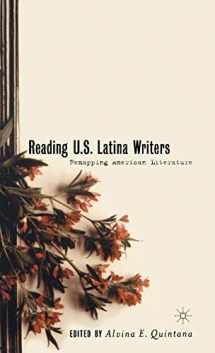
Reading U.S. Latina Writers: Remapping American Literature
ISBN-13:
9780312294137
ISBN-10:
0312294131
Edition:
2003
Author:
A. Quintana
Publication date:
2003
Publisher:
Palgrave Macmillan
Format:
Hardcover
208 pages
FREE US shipping
Book details
ISBN-13:
9780312294137
ISBN-10:
0312294131
Edition:
2003
Author:
A. Quintana
Publication date:
2003
Publisher:
Palgrave Macmillan
Format:
Hardcover
208 pages
Summary
Reading U.S. Latina Writers: Remapping American Literature (ISBN-13: 9780312294137 and ISBN-10: 0312294131), written by authors
A. Quintana, was published by Palgrave Macmillan in 2003.
With an overall rating of 4.0 stars, it's a notable title among other
books. You can easily purchase or rent Reading U.S. Latina Writers: Remapping American Literature (Hardcover) from BooksRun,
along with many other new and used
books
and textbooks.
And, if you're looking to sell your copy, our current buyback offer is $0.3.
Description
This essential teaching guide focuses on an emerging body of literature by U.S. Latina and Latin American Women writers. It will assist non-specialist educators in syllabus revision, new course design and classroom presentation. The inclusive focus of the book - that is, combining both US Latina and Latin American women writers - is significant because it introduces a more global and transnational way of approaching the literature. The introduction outlines the major historical experiences that inform the literature, the important genres, periods, movements and authors in its evolution; the traditions and influences that shape the works; and key critical issues of which teachers should be aware. The collection seeks to provide readers with a variety of Latina texts that will guarantee its long-term usefulness to teachers and students of pan-American literature. Because it is no longer possible to understand U.S. Latina literature without taking into consideration the histories and cultures of Latin America, the volume will, through its organization, argue for a more globalized type of analysis which considers the similarities as well as the differences in U.S. and Latin American women's cultural productions. In this context, the term Latina evokes a diasporic, transnational condition in order to address some of the pedagogical issues posed by the bicultural nature which is inherent in pan-American women's literature.


We would LOVE it if you could help us and other readers by reviewing the book
Book review

Congratulations! We have received your book review.
{user}
{createdAt}
by {truncated_author}


